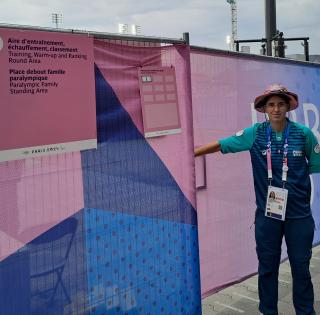
A new year means new resolutions! And those of ENSTA Bretagne for 2023 are ambitious. Large scale renovation projects are about to begin.
Their aim? To re-design the student residence's living environment, improve the thermal performance of several buildings and build a brand new robotics research facility. And to do this, everything is ready: the new required services have been listed, the specifications finalized, the financing gathered¹, the architectural and project management studies are under way, the work contracts are being prepared and, within the next few weeks or months, the building sites will begin.

Construction of a new unit for mobile robotics and to test the "missing link"
The robotics activity is booming in industry and at ENSTA Bretagne. Its potential applications are huge, including observation, surveillance and search and rescue. Drones take over whenever human action reaches its limits (including tasks that are too repetitive, too long, too costly or in dangerous areas), whether in the air, at sea or on land.
At the start of the 2022 academic year, a new milestone was reached at ENSTA Bretagne, in that the number of robotics engineers has now doubled. At the same time, the team has expanded and much research work is carried out. The originality of the school is to prepare the mobile drone systems of the future, for exploration and intervention, in multiple environments (land, air and sea). ENSTA Bretagne is indeed the leading graduate and postgraduate school in France for autonomous marine robotics. This is the "missing link" on most campuses, as this communicating robotic system is the most difficult system to develop. Indeed, to operate in the marine environment, drones have to use techniques and methods that are completely different from their land-based and flying cousins. This calls for multiple skills to be brought together on the campus, including mathematics, AI, physics of the marine environment, sensors, acoustic observation and control laws. But the nearness to the sea and a vast field of experimentation are no longer enough.
The creation of this new building is therefore highly anticipated and is a first of its kind in France. The test areas assume the use of a location that does not interfere with ongoing human activities and in which settings can be easily varied based on the needs of the study. The solution adopted was a closed test infrastructure, provided with a vast basin (20m x 12m and 6m deep), launching devices, control stations and mobile observation areas, all with an overhead indoor flight area. The quality of the GPS signal reception was a consideration that affected the choice of materials. The building was therefore designed to meet the technical issues raised during the robotics tests under real conditions. This new building will allow the testing of underwater, surface and flying drones.
The construction site will be initiated at the end of the winter with the destruction of an old building... to accommodate this brand new building for research in marine and aerial robotics. This new facility is due to open in 2024.

Other major transformations are to begin in the student residence and on campus
222 students live on the ENSTA Bretagne campus, in a huge student residence built at the end of the 1980s. Its thermal performance needs to be improved and this will provide an opportunity to refurbish these living spaces.
The 6 buildings will be renovated in turn and the interior layout completely reorganized. This ambitious €10 million project should provide students with a better individual and collective living environment. Each room will now have an individual bathroom and kitchenette. User-friendly spaces will also be created on each floor. At the same time, the residence's thermal insulation should provide 40 to 50% energy savings. Work on the first building is due to begin in August 2023 and will last around 6 months. The work is due to be completed in 2027.
At the same time, several of the school's buildings are also to be renovated. Reducing energy waste is one of the building program's priorities. Flat roofs are to be renovated and the window frames of several buildings replaced.

Finally, the interior of buildings are also to be renovated to create new work spaces that are less compartmentalized and which will promote group work, meetings, transdisciplinarity and creativity. The project to renovate the space encompassing La Ruche and the teaching management offices will be completely redesigned. It is carried out in parallel with the reorganization of "informal" teaching spaces in various parts of the school, conducive to project work and conviviality.
These choices were guided by the aim of improving the quality of the student experience and reducing the campus' environmental impact. A campus that is more eco-friendly and provides ever more comprehensive services is thus in the offing. See you next year for the start of the work!
Thanks go to the teams involved, in particular the team from the Heritage and Logistics Department (DPL) which is managing the construction program.
¹ This work is financed by the 2021-2027 State/Region plan contract, for an amount of €13.2 million.
² La Ruche includes services for students and staff in corporate and international relations, and the incubator.
³ DPL includes the campus' technical services.
















